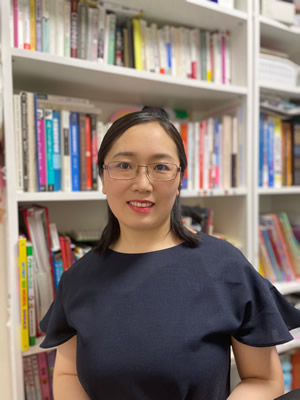 The 20th Asia Pacific Research Prize (Iue Prize) winner: Dr. Yu Haichun
The 20th Asia Pacific Research Prize (Iue Prize) winner: Dr. Yu Haichun
Title of Dissertation: “ The Multi-layered Nature of Media Control under the Chinese Authoritarian System: Comparative Analysis of Local Media and the Media System in China Today ”

- Dr. Yu Haichun
-
- Career -
Yu Haichun specializes in political communication, and has earned a Ph.D. in Journalism. She graduated from Harbin Normal University, China in July 2007, and received her M.A. from the Graduate School of International Media, Communication and Tourism Studies, Hokkaido University, in March 2010. In April 2011, she entered the Doctoral Program of Journalism Course, the Graduate School of Political Science, Waseda University (she left in 2019 having completed her research guidance), and earned a Ph.D. in February 2021. Since April 2021, she has been working as an adjunct instructor at Kanagawa University. She is currently a Junior Researcher at Waseda Institute of Political Economy.
- Summary -
Since China embarked on reform and open-door policies, relations between the media and the authorities under the Chinese authoritarian system have become much more complex than before the commercialization of the media. This paper clarifies the multi-layered nature and diversity of media control under the Chinese authoritarian system by taking a close look at the Chinese local media system and analyzing factors that influence local media practices from the perspective of regional comparison.Chapter 1 of this paper puts forward the theory that local media practices are determined by a combination of political control and market competition. In addition, four types of empirical analysis are conducted to clarify factors that influence the news production of local media. Chapter 2 identifies the characteristics of news production by local newspapers under the Chinese authoritarian system-temporal changes and regional differences in particular-through the analysis of reportage of political corruption. Chapter 3 presents factual evidence, with a focus on how to determine the person with ultimate responsibility in local media groups, to indicate how changes in the degree of personnel control affect the news production of local newspapers. Chapter 4 reveals how the leadership role played by the Chinese Communist Party/government in the production and allotment of professional honors in the media industry has influenced the practices of local journalists. Chapter 5 presents evidence to prove that the degree of competition in the local newspaper market correlates with how much emphasis a local newspaper places on criticism of authority. And finally, Chapter 6 confirms, through analysis of panel data-based statistical analysis, that all three factors of personnel control, prizes awarded to newspaper articles, and market competition have had impacts on the local newspaper practices.
Based on the results of the empirical analysis, this paper draws the following three conclusions. First, the way to control the media under the Chinese authoritarian system is characterized by diversity and sophisticated techniques of media control. Second, the multi-layered structure of the Chinese media control system and the diversity of the local media system are demonstrated. Lastly, there is a high possibility that media control has undergone significant changes and entered a new phase since Xi Jinping came into power.






